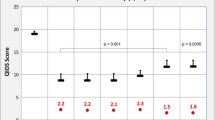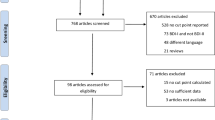Abstract
This study aims to characterize associations between depression symptom severity and HIV infection, both prior to and in years after ART initiation, among older adults. The Ugandan Non-Communicable Diseases & Aging Cohort Study (UGANDAC) is a study of 154 PLWH on ART and 142 community-based, HIV-negative controls. The Hopkins Checklist (HSCL), a 15-item depression scale, was used to screen for depression. We estimate differences in depressive symptoms by HIV and ART status and use multivariable log binomial regression to quantify differences in probable depression between PLWH on ART. HIV-infected and HIV-uninfected participants had a similar age (mean 52.0 vs. 51.9, p = 0.854) and sex distribution (47.4 vs. 47.9% female, p = 0.934). PLWH on ART had lower depression symptom severity than HIV-uninfected controls (mean score: 1.50 vs. 1.60, p = 0.006) and a lower prevalence of probable depression (21.4 vs. 33.8%, p = 0.017). Among 102 PLWH with pre-ART depression screening scores available, their mean depression symptom severity was similar to HIV-uninfected participants (mean 1.56 vs. 1.60, p = 0.512). In adjusted models, PLWH on ART had a lower prevalence of probable depression than HIV-negative controls [adjusted prevalence ratio: 0.68 (95% CI 0.47–0.99)]. In an observational cohort of PLWH over 40 on long-term ART and matched, community-based HIV-uninfected controls in rural Uganda, we found a lower prevalence of self-reported depression among aging PLWH on ART.


Similar content being viewed by others
References
Bor J, Herbst AJ, Newell ML, Barnighausen T. Increases in adult life expectancy in rural South Africa: valuing the scale-up of HIV treatment. Science. 2013;339(6122):961–5.
Bloomfield GS, Khazanie P, Morris A, et al. HIV and noncommunicable cardiovascular and pulmonary diseases in low- and middle-income countries in the ART era: what we know and best directions for future research. J Acquir Immune Defic Syndr. 2014;67(Suppl 1):S40–53.
Bernard C, Dabis F, de Rekeneire N. Prevalence and factors associated with depression in people living with HIV in sub-Saharan Africa: a systematic review and meta-analysis. PLoS ONE. 2017;12(8):e0181960.
Tsai AC. Reliability and validity of depression assessment among persons with HIV in sub-Saharan Africa: systematic review and meta-analysis. J Acquir Immune Defic Syndr. 2014;66(5):503–11.
Mendenhall E, Kohrt BA, Norris SA, Ndetei D, Prabhakaran D. Non-communicable disease syndemics: poverty, depression, and diabetes among low-income populations. Lancet. 2017;389(10072):951–63.
Heestermans T, Browne JL, Aitken SC, Vervoort SC, Klipstein-Grobusch K. Determinants of adherence to antiretroviral therapy among HIV-positive adults in sub-Saharan Africa: a systematic review. BMJ Glob Health. 2016;1(4):e000125.
Wroe EB, Hedt-Gauthier BL, Franke MF, Nsanzimana S, Turinimana JB, Drobac P. Depression and patterns of self-reported adherence to antiretroviral therapy in Rwanda. Int J STD AIDS. 2015;26(4):257–61.
Seth P, Kidder D, Pals S, et al. Psychosocial functioning and depressive symptoms among HIV-positive persons receiving care and treatment in Kenya, Namibia, and Tanzania. Prev Sci. 2014;15(3):318–28.
Byakika-Tusiime J, Crane J, Oyugi JH, et al. Longitudinal antiretroviral adherence in HIV + Ugandan parents and their children initiating HAART in the MTCT-Plus family treatment model: role of depression in declining adherence over time. AIDS Behav. 2009;13(Suppl 1):82–91.
Uthman OA, Magidson JF, Safren SA, Nachega JB. Depression and adherence to antiretroviral therapy in low-, middle- and high-income countries: a systematic review and meta-analysis. Curr HIV/AIDS Rep. 2014;11(3):291–307.
Bijker R, Jiamsakul A, Kityo C, et al. Adherence to antiretroviral therapy for HIV in sub-Saharan Africa and Asia: a comparative analysis of two regional cohorts. J Int AIDS Soc. 2017;20(1):21218.
Chan BT, Tsai AC. HIV stigma trends in the general population during antiretroviral treatment expansion: analysis of 31 countries in sub-Saharan Africa, 2003–2013. J Acquir Immune Defic Syndr. 2016;72(5):558–64.
Katz IT, Ryu AE, Onuegbu AG, et al. Impact of HIV-related stigma on treatment adherence: systematic review and meta-synthesis. J Int AIDS Soc. 2013;16(3 Suppl 2):18640.
Tsai AC. Socioeconomic gradients in internalized stigma among 4,314 persons with HIV in sub-Saharan Africa. AIDS Behav. 2015;19(2):270–82.
Hatcher AM, Tsai AC, Kumbakumba E, et al. Sexual relationship power and depression among HIV-infected women in Rural Uganda. PLoS ONE. 2012;7(12):e49821.
Nduna M, Jewkes RK, Dunkle KL, Shai NP, Colman I. Associations between depressive symptoms, sexual behaviour and relationship characteristics: a prospective cohort study of young women and men in the Eastern Cape. South Africa. J Int AIDS Soc. 2010;13:44.
Lundberg P, Rukundo G, Ashaba S, et al. Poor mental health and sexual risk behaviours in Uganda: a cross-sectional population-based study. BMC Public Health. 2011;11:125.
Cichowitz C, Maraba N, Hamilton R, Charalambous S, Hoffmann CJ. Depression and alcohol use disorder at antiretroviral therapy initiation led to disengagement from care in South Africa. PLoS ONE. 2017;12(12):e0189820.
Tsai AC, Weiser SD, Petersen ML, Ragland K, Kushel MB, Bangsberg DR. A marginal structural model to estimate the causal effect of antidepressant medication treatment on viral suppression among homeless and marginally housed persons with HIV. Arch Gen Psychiatr. 2010;67(12):1282–90.
Kaharuza FM, Bunnell R, Moss S, et al. Depression and CD4 cell count among persons with HIV infection in Uganda. AIDS Behav. 2006;10(4 Suppl):S105–11.
Kinyanda E, Weiss HA, Levin J, et al. Incidence and persistence of major depressive disorder among people living with HIV in Uganda. AIDS Behav. 2017;21(6):1641–54.
Nakasujja N, Skolasky RL, Musisi S, et al. Depression symptoms and cognitive function among individuals with advanced HIV infection initiating HAART in Uganda. BMC Psychiatr. 2010;10:44.
Tsai AC, Bangsberg DR, Frongillo EA, et al. Food insecurity, depression and the modifying role of social support among people living with HIV/AIDS in rural Uganda. Soc Sci Med. 2012;74(12):2012–9.
Kinyanda E, Kuteesa M, Scholten F, Mugisha J, Baisley K, Seeley J. Risk of major depressive disorder among older persons living in HIV-endemic central and southwestern Uganda. AIDS Care. 2016;28(12):1516–21.
Chan BT, Tsai AC, Siedner MJ. HIV treatment scale-up and HIV-related stigma in sub-Saharan Africa: a longitudinal cross-country analysis. Am J Public Health. 2015;105(8):1581–7.
Ginzburg HM, Fleming PL, Miller KD. Selected public health observations derived from Multicenter AIDS Cohort Study. J Acquir Immune Defic Syndr. 1988;1(1):2–7.
Adimora AA, Ramirez C, Benning L, et al. Cohort profile: the Women’s Interagency HIV Study (WIHS). Int J Epidemiol. 2018;47(2):393–394i.
North CM, Allen JG, Okello S, et al. HIV infection, pulmonary tuberculosis, and COPD in rural Uganda: a cross-sectional study. Lung. 2017;196(1):49–57.
Siedner MJ, Lankowski A, Tsai AC, et al. GPS-measured distance to clinic, but not self-reported transportation factors, are associated with missed HIV clinic visits in rural Uganda. AIDS. 2013;27(9):1503–8.
Global Health Collaborative—MUST Uganda. Global Health Collaborative—MUST Uganda, 2018. http://ghcuganda.org/our-work/research-innovation/hopenet/. Accessed May 30, 2018.
Ashaba S, Kakuhikire B, Vorechovska D, et al. Reliability, validity, and factor structure of the Hopkins Symptom Checklist-25: population-based study of persons living with HIV in rural Uganda. AIDS Behav. 2017;22(5):1467–74.
Derogatis LR, Lipman RS, Rickels K, Uhlenhuth EH, Covi L. The Hopkins Symptom Checklist (HSCL). A measure of primary symptom dimensions. Mod Probl Pharmacopsychiatr. 1974;7:79–110.
Filmer D, Pritchett LH. Estimating wealth effects without expenditure data–or tears: an application to educational enrollments in states of India. Demography. 2001;38(1):115–32.
Manne-Goehler J, Montana L, Gomez-Olive FX, et al. The ART advantage: health care utilization for diabetes and hypertension in Rural South Africa. J Acquir Immune Defic Syndr. 2017;75(5):561–7.
Norcini Pala A, Steca P, Bagrodia R, et al. Subtypes of depressive symptoms and inflammatory biomarkers: an exploratory study on a sample of HIV-positive patients. Brain Behav Immun. 2016;56:105–13.
Bor J, Tanser F, Newell ML, Barnighausen T. In a study of a population cohort in South Africa, HIV patients on antiretrovirals had nearly full recovery of employment. Health Aff (Millwood). 2012;31(7):1459–69.
Mitton JA, North CM, Muyanja D, et al. Smoking cessation after engagement in HIV care in rural Uganda. AIDS Care. 2018;38:1–8.
Tsai AC, Bangsberg DR, Bwana M, et al. How does antiretroviral treatment attenuate the stigma of HIV? Evidence from a cohort study in rural Uganda. AIDS Behav. 2013;17(8):2725–31.
Campbell C, Skovdal M, Madanhire C, Mugurungi O, Gregson S, Nyamukapa C. We, the AIDS people: how antiretroviral therapy enables Zimbabweans living with HIV/AIDS to cope with stigma. Am J Public Health. 2011;101(6):1004–10.
Martinez P, Tsai AC, Muzoora C, et al. Reversal of the Kynurenine pathway of tryptophan catabolism may improve depression in ART-treated HIV-infected Ugandans. J Acquir Immune Defic Syndr. 2014;65(4):456–62.
Feinstein MJ, Kim JH, Bibangambah P, et al. Ideal cardiovascular health and carotid atherosclerosis in a mixed cohort of HIV-infected and uninfected Ugandans. AIDS Res Hum Retrovir. 2017;33(1):49–56.
Langebeek N, Kooij KW, Wit FW, et al. Impact of co-morbidity and aging on health-related quality of life in HIV-positive and HIV-negative individuals. AIDS. 2017;31(10):1471–81.
Do AN, Rosenberg ES, Sullivan PS, et al. Excess burden of depression among HIV-infected persons receiving medical care in the united states: data from the medical monitoring project and the behavioral risk factor surveillance system. PLoS ONE. 2014;9(3):e92842.
Eaton EF, Gravett RM, Tamhane AR, Mugavero MJ. Antiretroviral therapy initiation and changes in self-reported depression. Clin Infect Dis. 2017;64(12):1791–4.
Ferrari AJ, Charlson FJ, Norman RE, et al. Burden of depressive disorders by country, sex, age, and year: findings from the global burden of disease study 2010. PLoS Med. 2013;10(11):e1001547.
Kigozi F, Ssebunnya J, Kizza D, et al. An overview of Uganda’s mental health care system: results from an assessment using the world health organization’s assessment instrument for mental health systems (WHO-AIMS). Int J Ment Health Syst. 2010;4(1):1.
Weissman MM, Klerman GL. Sex differences and the epidemiology of depression. Arch Gen Psychiatr. 1977;34(1):98–111.
Rwakarema M, Premji SS, Nyanza EC, Riziki P, Palacios-Derflingher L. Antenatal depression is associated with pregnancy-related anxiety, partner relations, and wealth in women in Northern Tanzania: a cross-sectional study. BMC Womens Health. 2015;15:68.
Lund C, De Silva M, Plagerson S, et al. Poverty and mental disorders: breaking the cycle in low-income and middle-income countries. Lancet. 2011;378(9801):1502–14.
Funding
This study was funded by the U.S. National Institutes of Health R21 HL124712, P30 AI060354, R24 AG044325, P30 AG024409, MGH Executive Committee on Research, and Friends of a Healthy Uganda. The authors acknowledge the following additional sources of support: K23 MH096620; K23 MH099916.
Author information
Authors and Affiliations
Corresponding author
Ethics declarations
Conflict of interest
All authors declare no conflicts of interest.
Ethical Approval
All procedures performed in studies involving human participants were in accordance with the ethical standards of the institutional and/or national research committee and with the 1964 Helsinki declaration and its later amendments or comparable ethical standards.
Informed Consent
Informed consent was obtained from all individual participants included in the study.
Electronic Supplementary Material
Below is the link to the electronic supplementary material.
Rights and permissions
About this article
Cite this article
Manne-Goehler, J., Kakuhikire, B., Abaasabyoona, S. et al. Depressive Symptoms Before and After Antiretroviral Therapy Initiation Among Older-Aged Individuals in Rural Uganda. AIDS Behav 23, 564–571 (2019). https://doi.org/10.1007/s10461-018-2273-4
Published:
Issue Date:
DOI: https://doi.org/10.1007/s10461-018-2273-4




